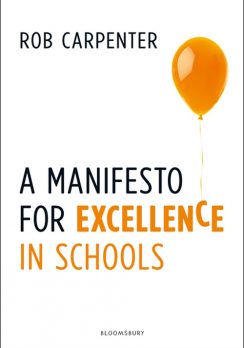Publisher
Bloomsbury Education
ISBN 10
We’ve all heard the narrative. A school goes into special measures and a “super-head” is parachuted in. He or she gets rid of the ostensibly worst-performing teachers, or at least allocates them to where they can do the least harm to the school’s league tables. The pupils in years 5 and 6 are trained to “ace” the SATs, the curriculum is constricted accordingly. Ofsted returns, the school is recategorised, the head moves on, and only then does the wreckage surface: ignored pupils in the lower year groups, massive overspending, and exhausted and demoralised staff.
With this in mind, I approached this book with no small degree of cynicism when I read in the “blurb” on the back that said the author had turned his school around in less than two years. However, it soon became clear that Carpenter is no quick-fix merchant. His underlying philosophy is that relationships and whole-person development are crucial for sustainable success. We place too much emphasis, he says, on cognitive learning and not enough on affective learning. Both are necessary if long-term learning and development, including the child’s emotional strength, are to be enjoyed.
Reading this was like a breath of fresh air. For example, it ought to be obvious that, to quote from the book, “beautiful buildings create beautiful people”. All too often, though, teachers and pupils have to work in environments that are less than salubrious. At some level this tells them that their well-being and sense of feeling valued are not high on the list of priorities.
If all this sounds like a call to don beads, light incense sticks, and walk around declaring “love and peace, man”, you will be relieved to learn that the book is more than a feelgood story, it’s also full of implementable advice. In other words, it will prove useful to any senior leadership team faced with similar circumstances, and who may be thinking, “What on earth should I do?”
Carpenter is no quick-fix merchant
The advice takes several forms. First, there are numerous tables summarising the differences between various approaches to school reform and other areas. One table, for example, contrasts the characteristics of what the author calls a “school-improving” culture and a “proving” one. The former leads to a commitment to distributed leadership and a willingness to take risks and learn from mistakes. The latter, in contrast, is concerned with quality control and avoiding mistakes, which are seen as symptoms of failure.
Second, in the spirit of “show don’t tell”, or at least “show as well as tell”, the book includes photographs that show what is being referred to. For instance, there is a photo of a “book corner”, which looks as warm and inviting as the author describes. Another is of the “staff shout-out” board, on which small successes by teachers are shared and celebrated.
Third, and perhaps most importantly for any school leader, several very detailed rubrics cover just about every aspect of school life. One, for example, is a “culture and climate rubric” for creating an “enabling environment”. The “grades” in these rubrics tend to be in the form of terms such as “emerging”, as opposed to “poor”, all the way up to “embedded excellence”.
Finally, checklists and lists entitled “key questions to consider” appear in many chapters.
There are a few omissions. For example, it would have been useful to hear Carpenter’s advice on how to bring on board staff who are entrenched in their approach. This, I feel, is glossed over.
Another drawback is not delving into budgets. How did he convince the governors that refurbishing the whole school was a good use of money?
Last, although the book is well-structured, it suffers from the lack of an index.
These shortcomings aside, however, it is a must for any school leader determined to create a school that is children-centred in practice, not just in the school prospectus.













Your thoughts